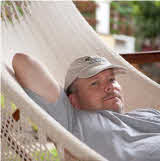Who is Palmex?

Many of us Expats have bought homes here and are often searching for products to renovate our tropical paradise. If you have a bohio that needs re-thatching or maybe you are planning on adding a new structure to your property, maybe it's time to investigate alternatives to the same old same old in roofing products. Palmex, on the hiway between Bejuco and Chame may have just what you've been looking for. Canadian born Montreal-er Sylvain Duford started the business here just a few short years ago. Before moving to Panama, Sylvain and his wife came for a visit first. Like many visitors do, they bought a lot right away. They chose Altos Del Maria as a great place to retire, which they hoped to do in 7 or 8 years. Of course Panama got to them and after a few more visits it was decided that they would move here earlier than planned and start building a home on their lot. Sylvain discovered Palmex thatched roofs while their house was under construction.
After discussing it with another Canadian friend, Sylvain made a decision to invest in a branch of Palmex in Panama in 2007. His partner moved to Panama and began the process of getting things going here. Unfortunately Sylvain’s partner died in an accident in December 2008 and he lost not only a friend, but also the backbone to his company and part of the reason why he had chosen to invest in the first place.
This turn of events prompted a move to Panama ahead of schedule. So in 2009, Sylvain and his wife arrived in Panama to stay. Not knowing anything about roofing and not speaking Spanish, Sylvain was thrown into the frying pan so to speak. Previously, he had been a director in a large IT Consulting firm where he spent his time in airplanes and hotels working on high stress projects. As you can imagine, the stress was high at the onset of a new business especially after the loss of a partner. But Sylvain knew that the key to any successful business is people. So he surrounded himself with the right people and with their help succeeded in getting the business back on track.
The history of the product began with two French men who were at the time living in Tahiti, where all roofs must be thatched. They were becoming frustrated with the problems that ensued from using natural palm leaves so in 1999 they started working on a solution. They installed their production line in Quebec because that is where the supplier of raw plastic material was located (Pelican Boats). The company has been growing about 30-40% a year and the product is now sold in over 25countries.
As for the product itself the synthetic palm leaves are derived from crude, actually from a by-product of crude refining, therefore using one of the three R's, (reduce, reuse, recycle.) True the product is made of plastic and is therefore a by-product of the oil industry, but perhaps that isn't as bad as one might think. Harvesting of natural palms isn't that great for the environment either.
Over a period of 50 years natural palms would have to be replaced approximately 10-15 times. For a roof of 200 m ², that would mean you would have to harvest more than 2000 m² of palm leaves. This not only damages hundreds of trees but if not done properly it often results in the death of those trees. Some may argue that trees are a renewable resource but their harvesting nevertheless is damaging to the environment.
What about the transportation of those natural palm leaves, which often have to come from far away like Chiriqui or even Nicaragua? Additionally, one would have to dispose of an equal quantity of used palms not mentioning rafters or other structural elements rotted by leaks or infested by insects, requiring transportation and burning. Still think natural leaves are better, with a roof of natural palms you will have to use many liters of chemicals (and plastic jugs, brushes, masks, man-hours, etc.) to treat these palms, to waterproof them and to control the insects. How many roofs covered with natural palms have we not seen over the years using plastic sheets to try to prevent leaking?
The “green factor” of the product has been important in countries like Tahiti and Costa Rica where preservation of the environment and the trees is a high priority. Here in Panama, the green movement is just beginning, but there are more and more eco-resorts popping up and Sylvain believes that it will become a more important factor to resorts in the future, not to mention offering lower maintenance costs.
Palmex can often take Sylvain all over the country. Which sometimes offers him the opportunity to work on his passion, photography. Sylvain currently runs the Coronado Photo Club on line and he says that perhaps when it's time to really retire he would love to do a photography book on Panama.
To learn more about Palmex and to see additional photos of their work, visit their website at http://palmexpanama.com/photo-gallery/
